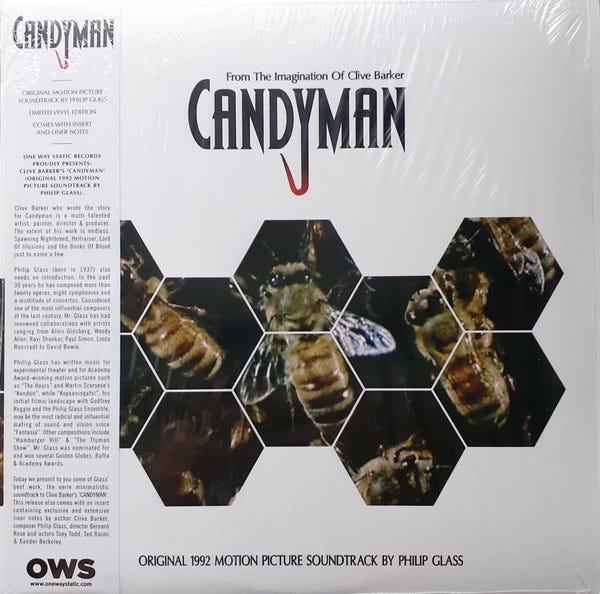Philip Glass writes the sweetest melodies. And something that sweet turns into something sinister. There is something Wagner-like in that he can develop a musical riff that is an instant earworm of a melody. It’s like a friendly arm around you, but you’re unsure if the other hand has a dagger. I have never seen the film Candyman, but I’m a fan of the music that Glass wrote as its score.
I wouldn’t say I’m a devoted fan of Glass’s work, but I greatly admire his career as a composer and musician. I saw the Philip Glass Ensemble some years ago, which was a powerful experience. The music live was loud, and it was impossible not to head-bang to its rhythm. I have never seen him doing an acoustic music concert, solo, or even his operas, but it is always a spectacle whenever the name Philip Glass appears. And I think that is why he reminds me of Wagner. It’s that total emersion of sight, sound, cinema, and emotion. Like a beautiful melody one knows, and you hear it in the bar’s jukebox, and one’s feelings are on the surface, it can be a very moving series of moments. Glass can put me in that spot, that is bittersweet, sad, and the mood of the something not quite right. This makes the meeting of Glass’s music with a horror film a great match.
Concerning his scores for films, Mishima is his masterpiece. I also think the film by Paul Schrader is masterful in that it is the best film about a writer. As one can gather, many film bios on writers are scenes where they struggle in front of an open notebook with their pen or usually a nice-looking typewriter. Since there were restrictions from Mishima’s widow on what could be shown or mentioned, Schrader had to go through Mishima’s novels to tell the tale of his life. A lesser composer would add ‘oriental’ touches to the score for such an iconic Japanese writer. Glass’s music is very grand and American, with an endless horizon in front of it. Although Mishima is Japanese, and one would think his work is within that framework, it is very expansive with a mixture of Japanese feeling with International touches. I haven’t seen Candyman, but again, Glass’s score for this film is so beautiful that I imagine that the juxtaposition of beauty and horror would fit quite well.
Candyman opens with a music-box melody that is seductive to a childhood memory. That main piece shadows the rest of the music, and one waits for it to come back and embrace the listener. The world of children is usually dark, and fairy tales and nursery rhymes hint that if you’re not careful, disaster will happen to you. Musically, Candyman conveys that dread that every child knows deep in their little heart, even if they are now grown-up. One never loses touch with that dark adventure.




I’ll have to give Candyman a listen. I was just watching your fascinating Tea with Tosh interview with Philip Glass. Thanks for making all those great Tea with Tosh episodes available on YouTube. What a treasure trove!